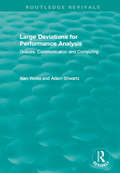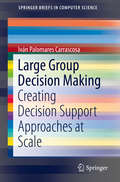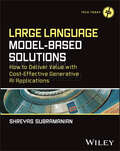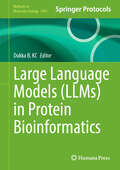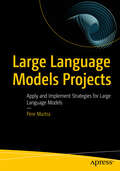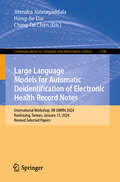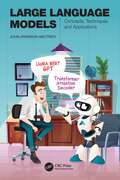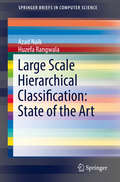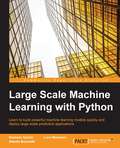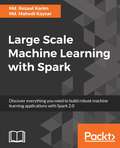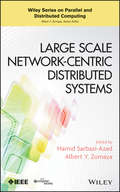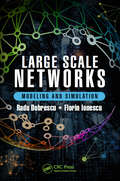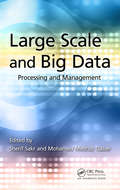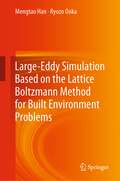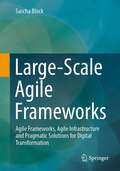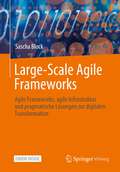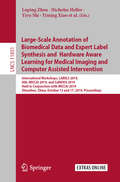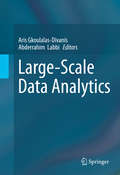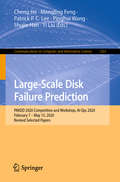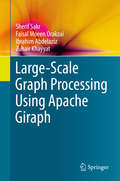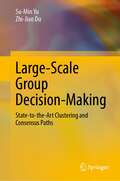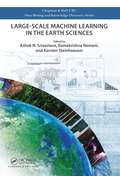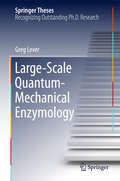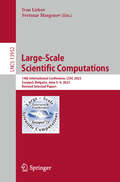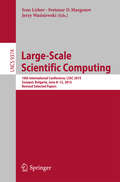- Table View
- List View
Large Deviations For Performance Analysis: Queues, Communication and Computing (Routledge Revivals)
by Alan Weiss Adam ShwartzOriginally published in 1995, Large Deviations for Performance Analysis consists of two synergistic parts. The first half develops the theory of large deviations from the beginning, through recent results on the theory for processes with boundaries, keeping to a very narrow path: continuous-time, discrete-state processes. By developing only what is needed for the applications, the theory is kept to a manageable level, both in terms of length and in terms of difficulty. Within its scope, the treatment is detailed, comprehensive and self-contained. As the book shows, there are sufficiently many interesting applications of jump Markov processes to warrant a special treatment. The second half is a collection of applications developed at Bell Laboratories. The applications cover large areas of the theory of communication networks: circuit switched transmission, packet transmission, multiple access channels, and the M/M/1 queue. Aspects of parallel computation are covered as well including, basics of job allocation, rollback-based parallel simulation, assorted priority queueing models that might be used in performance models of various computer architectures, and asymptotic coupling of processors. These applications are thoroughly analysed using the tools developed in the first half of the book.
Large Group Decision Making: Creating Decision Support Approaches at Scale (SpringerBriefs in Computer Science)
by Iván Palomares CarrascosaThis SpringerBrief provides a pioneering, central point of reference for the interested reader in Large Group Decision Making trends such as consensus support, fusion and weighting of relevant decision information, subgroup clustering, behavior management, and implementation of decision support systems, among others. Based on the challenges and difficulties found in classical approaches to handle large decision groups, the principles, families of techniques, and newly related disciplines to Large-Group Decision Making (such as Data Science, Artificial Intelligence, Social Network Analysis, Opinion Dynamics, Behavioral and Cognitive Sciences), are discussed. Real-world applications and future directions of research on this novel topic are likewise highlighted.
Large Language Model-Based Solutions: How to Deliver Value with Cost-Effective Generative AI Applications (Tech Today)
by Shreyas SubramanianLearn to build cost-effective apps using Large Language Models In Large Language Model-Based Solutions: How to Deliver Value with Cost-Effective Generative AI Applications, Principal Data Scientist at Amazon Web Services, Shreyas Subramanian, delivers a practical guide for developers and data scientists who wish to build and deploy cost-effective large language model (LLM)-based solutions. In the book, you'll find coverage of a wide range of key topics, including how to select a model, pre- and post-processing of data, prompt engineering, and instruction fine tuning. The author sheds light on techniques for optimizing inference, like model quantization and pruning, as well as different and affordable architectures for typical generative AI (GenAI) applications, including search systems, agent assists, and autonomous agents. You'll also find: Effective strategies to address the challenge of the high computational cost associated with LLMs Assistance with the complexities of building and deploying affordable generative AI apps, including tuning and inference techniques Selection criteria for choosing a model, with particular consideration given to compact, nimble, and domain-specific models Perfect for developers and data scientists interested in deploying foundational models, or business leaders planning to scale out their use of GenAI, Large Language Model-Based Solutions will also benefit project leaders and managers, technical support staff, and administrators with an interest or stake in the subject.
Large Language Models (Methods in Molecular Biology #2941)
by Dukka B. KcThis book presents a comprehensive collection of methods, resources, and studies that use large language models (LLMs) in the field of protein bioinformatics. Reflecting the swift pace of LLM development today, the volume delves into numerous LLM-based tools to investigate proteins science, from protein language models to the prediction of protein-ligand binding sites. Written for the highly successful Methods in Molecular Biology series, chapters include the kind of detailed implementation advice to ensure success in future research. Authoritative and practical, Large Language Models (LLMs) in Protein Bioinformatics serves as an ideal guide for scientists seeking to tap into the potential of artificial intelligence in this vital area of biological study.
Large Language Models Projects: Apply and Implement Strategies for Large Language Models
by Pere MartraThis book offers you a hands-on experience using models from OpenAI and the Hugging Face library. You will use various tools and work on small projects, gradually applying the new knowledge you gain. The book is divided into three parts. Part one covers techniques and libraries. Here, you'll explore different techniques through small examples, preparing to build projects in the next section. You'll learn to use common libraries in the world of Large Language Models. Topics and technologies covered include chatbots, code generation, OpenAI API, Hugging Face, vector databases, LangChain, fine tuning, PEFT fine tuning, soft prompt tuning, LoRA, QLoRA, evaluating models, and Direct Preference Optimization. Part two focuses on projects. You'll create projects, understanding design decisions. Each project may have more than one possible implementation, as there is often not just one good solution. You'll also explore LLMOps-related topics. Part three delves into enterprise solutions. Large Language Models are not a standalone solution; in large corporate environments, they are one piece of the puzzle. You'll explore how to structure solutions capable of transforming organizations with thousands of employees, highlighting the main role that Large Language Models play in these new solutions. This book equips you to confidently navigate and implement Large Language Models, empowering you to tackle diverse challenges in the evolving landscape of language processing. What You Will Learn Gain practical experience by working with models from OpenAI and the Hugging Face library Use essential libraries relevant to Large Language Models, covering topics such as Chatbots, Code Generation, OpenAI API, Hugging Face, and Vector databases Create and implement projects using LLM while understanding the design decisions involved Understand the role of Large Language Models in larger corporate settings Who This Book Is For Data analysts, data science, Python developers, and software professionals interested in learning the foundations of NLP, LLMs, and the processes of building modern LLM applications for various tasks
Large Language Models for Automatic Deidentification of Electronic Health Record Notes: International Workshop, IW-DMRN 2024, Kaohsiung, Taiwan, January 15, 2024, Revised Selected Papers (Communications in Computer and Information Science #2148)
by Jitendra Jonnagaddala Hong-Jie Dai Ching-Tai ChenThis volume constitutes the refereed proceedings of the International Workshop on Deidentification of Electronic Health Record Notes, IW-DMRN 2024, held on January 15, 2024, in Kaohsiung, Taiwan. The 15 full papers were carefully reviewed and selected from 30 submissions. The conference focuses on medical data analysis, enhancing medication safety, and optimizing medical care efficiency.
Large Language Models: Concepts, Techniques and Applications
by John Atkinson-AbutridyThis book serves as an introduction to the science and applications of Large Language Models (LLMs). You'll discover the common thread that drives some of the most revolutionary recent applications of artificial intelligence (AI): from conversational systems like ChatGPT or BARD, to machine translation, summary generation, question answering, and much more.At the heart of these innovative applications is a powerful and rapidly evolving discipline, natural language processing (NLP). For more than 60 years, research in this science has been focused on enabling machines to efficiently understand and generate human language. The secrets behind these technological advances lie in LLMs, whose power lies in their ability to capture complex patterns and learn contextual representations of language. How do these LLMs work? What are the available models and how are they evaluated? This book will help you answer these and many other questions. With a technical but accessible introduction: You will explore the fascinating world of LLMs, from its foundations to its most powerful applications You will learn how to build your own simple applications with some of the LLMs Designed to guide you step by step, with six chapters combining theory and practice, along with exercises in Python on the Colab platform, you will master the secrets of LLMs and their application in NLP.From deep neural networks and attention mechanisms, to the most relevant LLMs such as BERT, GPT-4, LLaMA, Palm-2 and Falcon, this book guides you through the most important achievements in NLP. Not only will you learn the benchmarks used to evaluate the capabilities of these models, but you will also gain the skill to create your own NLP applications. It will be of great value to professionals, researchers and students within AI, data science and beyond.
Large Scale Hierarchical Classification: State of the Art (SpringerBriefs in Computer Science)
by Huzefa Rangwala Azad NaikThis SpringerBrief covers the technical material related to large scale hierarchical classification (LSHC). HC is an important machine learning problem that has been researched and explored extensively in the past few years. In this book, the authors provide a comprehensive overview of various state-of-the-art existing methods and algorithms that were developed to solve the HC problem in large scale domains. Several challenges faced by LSHC is discussed in detail such as: 1. High imbalance between classes at different levels of the hierarchy 2. Incorporating relationships during model learning leads to optimization issues 3. Feature selection 4. Scalability due to large number of examples, features and classes 5. Hierarchical inconsistencies 6. Error propagation due to multiple decisions involved in making predictions for top-down methods The brief also demonstrates how multiple hierarchies can be leveraged for improving the HC performance using different Multi-Task Learning (MTL) frameworks. The purpose of this book is two-fold: 1. Help novice researchers/beginners to get up to speed by providing a comprehensive overview of several existing techniques. 2. Provide several research directions that have not yet been explored extensively to advance the research boundaries in HC. New approaches discussed in this book include detailed information corresponding to the hierarchical inconsistencies, multi-task learning and feature selection for HC. Its results are highly competitive with the state-of-the-art approaches in the literature.
Large Scale Machine Learning with Python
by Alberto Boschetti Luca Massaron Bastiaan SjardinLearn to build powerful machine learning models quickly and deploy large-scale predictive applications About This Book * Design, engineer and deploy scalable machine learning solutions with the power of Python * Take command of Hadoop and Spark with Python for effective machine learning on a map reduce framework * Build state-of-the-art models and develop personalized recommendations to perform machine learning at scale Who This Book Is For This book is for anyone who intends to work with large and complex data sets. Familiarity with basic Python and machine learning concepts is recommended. Working knowledge in statistics and computational mathematics would also be helpful. What You Will Learn * Apply the most scalable machine learning algorithms * Work with modern state-of-the-art large-scale machine learning techniques * Increase predictive accuracy with deep learning and scalable data-handling techniques * Improve your work by combining the MapReduce framework with Spark * Build powerful ensembles at scale * Use data streams to train linear and non-linear predictive models from extremely large datasets using a single machine In Detail Large Python machine learning projects involve new problems associated with specialized machine learning architectures and designs that many data scientists have yet to tackle. But finding algorithms and designing and building platforms that deal with large sets of data is a growing need. Data scientists have to manage and maintain increasingly complex data projects, and with the rise of big data comes an increasing demand for computational and algorithmic efficiency. Large Scale Machine Learning with Python uncovers a new wave of machine learning algorithms that meet scalability demands together with a high predictive accuracy. Dive into scalable machine learning and the three forms of scalability. Speed up algorithms that can be used on a desktop computer with tips on parallelization and memory allocation. Get to grips with new algorithms that are specifically designed for large projects and can handle bigger files, and learn about machine learning in big data environments. We will also cover the most effective machine learning techniques on a map reduce framework in Hadoop and Spark in Python. Style and approach This efficient and practical title is stuffed full of the techniques, tips and tools you need to ensure your large scale Python machine learning runs swiftly and seamlessly. Large-scale machine learning tackles a different issue to what is currently on the market. Those working with Hadoop clusters and in data intensive environments can now learn effective ways of building powerful machine learning models from prototype to production. This book is written in a style that programmers from other languages (R, Julia, Java, Matlab) can follow.
Large Scale Machine Learning with Spark
by Md. Mahedi Kaysar Md. Rezaul KarimDiscover everything you need to build robust machine learning applications with Spark 2.0 About This Book * Get the most up-to-date book on the market that focuses on design, engineering, and scalable solutions in machine learning with Spark 2.0.0 * Use Spark's machine learning library in a big data environment * You will learn how to develop high-value applications at scale with ease and a develop a personalized design Who This Book Is For This book is for data science engineers and scientists who work with large and complex data sets. You should be familiar with the basics of machine learning concepts, statistics, and computational mathematics. Knowledge of Scala and Java is advisable. What You Will Learn * Get solid theoretical understandings of ML algorithms * Configure Spark on cluster and cloud infrastructure to develop applications using Scala, Java, Python, and R * Scale up ML applications on large cluster or cloud infrastructures * Use Spark ML and MLlib to develop ML pipelines with recommendation system, classification, regression, clustering, sentiment analysis, and dimensionality reduction * Handle large texts for developing ML applications with strong focus on feature engineering * Use Spark Streaming to develop ML applications for real-time streaming * Tune ML models with cross-validation, hyperparameters tuning and train split * Enhance ML models to make them adaptable for new data in dynamic and incremental environments In Detail Data processing, implementing related algorithms, tuning, scaling up and finally deploying are some crucial steps in the process of optimising any application. Spark is capable of handling large-scale batch and streaming data to figure out when to cache data in memory and processing them up to 100 times faster than Hadoop-based MapReduce. This means predictive analytics can be applied to streaming and batch to develop complete machine learning (ML) applications a lot quicker, making Spark an ideal candidate for large data-intensive applications. This book focuses on design engineering and scalable solutions using ML with Spark. First, you will learn how to install Spark with all new features from the latest Spark 2.0 release. Moving on, you'll explore important concepts such as advanced feature engineering with RDD and Datasets. After studying developing and deploying applications, you will see how to use external libraries with Spark. In summary, you will be able to develop complete and personalised ML applications from data collections,model building, tuning, and scaling up to deploying on a cluster or the cloud. Style and approach This book takes a practical approach where all the topics explained are demonstrated with the help of real-world use cases.
Large Scale Network-Centric Distributed Systems
by Albert Y. Zomaya Hamid Sarbazi-AzadA highly accessible reference offering a broad range of topics and insights on large scale network-centric distributed systemsEvolving from the fields of high-performance computing and networking, large scale network-centric distributed systems continues to grow as one of the most important topics in computing and communication and many interdisciplinary areas. Dealing with both wired and wireless networks, this book focuses on the design and performance issues of such systems.Large Scale Network-Centric Distributed Systems provides in-depth coverage ranging from ground-level hardware issues (such as buffer organization, router delay, and flow control) to the high-level issues immediately concerning application or system users (including parallel programming, middleware, and OS support for such computing systems). Arranged in five parts, it explains and analyzes complex topics to an unprecedented degree:Part 1: Multicore and Many-Core (Mc) Systems-on-ChipPart 2: Pervasive/Ubiquitous Computing and Peer-to-Peer SystemsPart 3: Wireless/Mobile NetworksPart 4: Grid and Cloud ComputingPart 5: Other Topics Related to Network-Centric Computing and Its ApplicationsLarge Scale Network-Centric Distributed Systems is an incredibly useful resource for practitioners, postgraduate students, postdocs, and researchers.
Large Scale Networks: Modeling and Simulation
by Radu Dobrescu Florin IonescuThis book offers a rigorous analysis of the achievements in the field of traffic control in large networks, oriented on two main aspects: the self-similarity in traffic behaviour and the scale-free characteristic of a complex network. Additionally, the authors propose a new insight in understanding the inner nature of things, and the cause-and-effect based on the identification of relationships and behaviours within a model, which is based on the study of the influence of the topological characteristics of a network upon the traffic behaviour. The effects of this influence are then discussed in order to find new solutions for traffic monitoring and diagnosis and also for traffic anomalies prediction. Although these concepts are illustrated using highly accurate, highly aggregated packet traces collected on backbone Internet links, the results of the analysis can be applied for any complex network whose traffic processes exhibit asymptotic self-similarity, perceived as an adaptability of traffic in networks. However, the problem with self-similar models is that they are computationally complex. Their fitting procedure is very time-consuming, while their parameters cannot be estimated based on the on-line measurements. In this aim, the main objective of this book is to discuss the problem of traffic prediction in the presence of self-similarity and particularly to offer a possibility to forecast future traffic variations and to predict network performance as precisely as possible, based on the measured traffic history.
Large Scale and Big Data: Processing and Management
by Mohamed Medhat Gaber Sherif SakrLarge Scale and Big Data: Processing and Management provides readers with a central source of reference on the data management techniques currently available for large-scale data processing. Presenting chapters written by leading researchers, academics, and practitioners, it addresses the fundamental challenges associated with Big Data processing t
Large-Eddy Simulation Based on the Lattice Boltzmann Method for Built Environment Problems
by Mengtao Han Ryozo OokaThis book details the lattice Boltzmann method (LBM) applied to the built environment problems. It provides the fundamental theoretical knowledge and specific implementation methods of LBM from the engineering perspective of the built environment. It covers comprehensive issues of built environment with three detailed cases, solving practical problems. It can be used as a reference book for teachers, students, and engineering technicians to study LBM and conduct architecture and urban wind environments simulations, in the fields of architecture, building technology science, urban planning, HVAC, built environment engineering, and civil engineering.
Large-Scale Agile Frameworks: Agile Frameworks, Agile Infrastructure and Pragmatic Solutions for Digital Transformation
by Sascha BlockThe book Large-Scale Agile Frameworks provides practical solutions for cross-team and cross-functional prioritization of requirements and documentation for enterprises. It reflects the interplay of current technology trends such as cloud computing and organizational requirements for microservices. Organizations are increasingly required to align their IT strategy with customer needs for customer-centric and service-oriented products and services. The book analyzes the unique requirements of a differentiated software service offering and shows how agile principles are effective in addressing these issues. The book also highlights the importance of large-scale agile development and provides guidance to organizations on how to transform their structure towards agile prioritization. The book covers various appropriate models, methodologies, and agile tools and provides recommendations for cross-functional prioritization of requirements. It also considers the need for IT security and shows how it can be integrated into the overall agile development process.
Large-Scale Agile Frameworks: Agile Frameworks, agile Infrastruktur und pragmatische Lösungen zur digitalen Transformation
by Sascha BlockWarum sollten Sie sich mit Large-Scale Agile Frameworks auseinandersetzen? Agilität in Unternehmen und Organisationen gewinnt zunehmend an Bedeutung. Dieses Buch unterstützt Sie mit praxisnahen Lösungen und Werkzeugen zur übergreifenden Priorisierung von Anforderungen zur Software-Entwicklung. So ermöglichen Sie bestmögliche digitale Lösungen und etablieren einen optimalen Informationsfluss in Ihrer Organisation.Mit agilen Organisationsstrukturen - auch als Large-Scale Agile Frameworks bekannt - werden Unternehmen und Organisationen anpassungsfähiger. Damit können sie schneller auf Veränderungen reagieren und werden wettbewerbsfähiger. Unterstützen Sie somit die bestmögliche Priorisierung der in agilen Teams organisierten Unternehmenseinheiten. Wissenschaftsorientiert werden Large-Scale Agile Frameworks im Kontext des Large-Scale Agile Development und dazugehöriger Agile Frameworks und agiler Methodik und Tools beleuchtet. Mit dem Domänenmodell (Domain Driven Design), dem Scaled Agile Framework (SAFe) und dem Spotify Engineering Model werden drei bekannte Frameworks vorgestellt. Dabei wird das Zusammenspiel aktueller Technologie-Themen wie des Cloud-Trends oder die organisatorischen Anforderungen im Hinblick auf Microservices und IT-Security reflektiert.
Large-Scale Annotation of Biomedical Data and Expert Label Synthesis and Hardware Aware Learning for Medical Imaging and Computer Assisted Intervention: International Workshops, LABELS 2019, HAL-MICCAI 2019, and CuRIOUS 2019, Held in Conjunction with MICCAI 2019, Shenzhen, China, October 13 and 17, 2019, Proceedings (Lecture Notes in Computer Science #11851)
by Emanuele Trucco Diana Mateus Veronika Cheplygina Yiming Xiao Hassan Rivaz Ingerid Reinertsen Matthieu Chabanas Raphael Sznitman Luping Zhou Yiyu Shi Nicholas Heller X. Sharon Hu Danny ChenThis book constitutes the refereed joint proceedings of the 4th International Workshop on Large-Scale Annotation of Biomedical Data and Expert Label Synthesis, LABELS 2019, the First International Workshop on Hardware Aware Learning for Medical Imaging and Computer Assisted Intervention, HAL-MICCAI 2019, and the Second International Workshop on Correction of Brainshift with Intra-Operative Ultrasound, CuRIOUS 2019, held in conjunction with the 22nd International Conference on Medical Imaging and Computer-Assisted Intervention, MICCAI 2019, in Shenzhen, China, in October 2019. The 8 papers presented at LABELS 2019, the 5 papers presented at HAL-MICCAI 2019, and the 3 papers presented at CuRIOUS 2019 were carefully reviewed and selected from numerous submissions. The LABELS papers present a variety of approaches for dealing with a limited number of labels, from semi-supervised learning to crowdsourcing. The HAL-MICCAI papers cover a wide set of hardware applications in medical problems, including medical image segmentation, electron tomography, pneumonia detection, etc. The CuRIOUS papers provide a snapshot of the current progress in the field through extended discussions and provide researchers an opportunity to characterize their image registration methods on newly released standardized datasets of iUS-guided brain tumor resection.
Large-Scale Data Analytics
by Aris Gkoulalas-Divanis Abderrahim LabbiThis edited book collects state-of-the-art research related to large-scale data analytics that has been accomplished over the last few years. This is among the first books devoted to this important area based on contributions from diverse scientific areas such as databases, data mining, supercomputing, hardware architecture, data visualization, statistics, and privacy. There is increasing need for new approaches and technologies that can analyze and synthesize very large amounts of data, in the order of petabytes, that are generated by massively distributed data sources. This requires new distributed architectures for data analysis. Additionally, the heterogeneity of such sources imposes significant challenges for the efficient analysis of the data under numerous constraints, including consistent data integration, data homogenization and scaling, privacy and security preservation. The authors also broaden reader understanding of emerging real-world applications in domains such as customer behavior modeling, graph mining, telecommunications, cyber-security, and social network analysis, all of which impose extra requirements for large-scale data analysis. Large-Scale Data Analytics is organized in 8 chapters, each providing a survey of an important direction of large-scale data analytics or individual results of the emerging research in the field. The book presents key recent research that will help shape the future of large-scale data analytics, leading the way to the design of new approaches and technologies that can analyze and synthesize very large amounts of heterogeneous data. Students, researchers, professionals and practitioners will find this book an authoritative and comprehensive resource.
Large-Scale Disk Failure Prediction: PAKDD 2020 Competition and Workshop, AI Ops 2020, February 7 – May 15, 2020, Revised Selected Papers (Communications in Computer and Information Science #1261)
by Yi Liu Cheng He Mengling Feng Patrick P. C. Lee Pinghui Wang Shujie HanThis book constitutes the thoroughly refereed post-competition proceedings of the AI Ops Competition on Large-Scale Disk Failure Prediction, conducted between February 7th and May 15, 2020 on the Alibaba Cloud Tianchi Platform. A dedicated workshop, featuring the best performing teams of the competition, was held at the 24th Pacific-Asia Conference on Knowledge Discovery and Data Mining, PAKDD 2020, in Singapore, in April 2019. Due to the COVID-19 pandemic, the workshop was hosted online. This book includes 13 selected contributions: an introduction to dataset, selected approaches of the competing teams and the competition summary, describing the competition task, practical challenges, evaluation metrics, etc.
Large-Scale Graph Processing Using Apache Giraph
by Sherif Sakr Faisal Moeen Orakzai Ibrahim Abdelaziz Zuhair KhayyatThis book takes its reader on a journey through Apache Giraph, a popular distributed graph processing platform designed to bring the power of big data processing to graph data. Designed as a step-by-step self-study guide for everyone interested in large-scale graph processing, it describes the fundamental abstractions of the system, its programming models and various techniques for using the system to process graph data at scale, including the implementation of several popular and advanced graph analytics algorithms. The book is organized as follows: Chapter 1 starts by providing a general background of the big data phenomenon and a general introduction to the Apache Giraph system, its abstraction, programming model and design architecture. Next, chapter 2 focuses on Giraph as a platform and how to use it. Based on a sample job, even more advanced topics like monitoring the Giraph application lifecycle and different methods for monitoring Giraph jobs are explained. Chapter 3 then provides an introduction to Giraph programming, introduces the basic Giraph graph model and explains how to write Giraph programs. In turn, Chapter 4 discusses in detail the implementation of some popular graph algorithms including PageRank, connected components, shortest paths and triangle closing. Chapter 5 focuses on advanced Giraph programming, discussing common Giraph algorithmic optimizations, tunable Giraph configurations that determine the system's utilization of the underlying resources, and how to write a custom graph input and output format. Lastly, chapter 6 highlights two systems that have been introduced to tackle the challenge of large scale graph processing, GraphX and GraphLab, and explains the main commonalities and differences between these systems and Apache Giraph. This book serves as an essential reference guide for students, researchers and practitioners in the domain of large scale graph processing. It offers step-by-step guidance, with several code examples and the complete source code available in the related github repository. Students will find a comprehensive introduction to and hands-on practice with tackling large scale graph processing problems using the Apache Giraph system, while researchers will discover thorough coverage of the emerging and ongoing advancements in big graph processing systems.
Large-Scale Group Decision-Making: State-to-the-Art Clustering and Consensus Paths
by Su-Min Yu Zhi-Jiao DuThis book explores clustering operations in the context of social networks and consensus-reaching paths that take into account non-cooperative behaviors. This book focuses on the two key issues in large-scale group decision-making: clustering and consensus building. Clustering aims to reduce the dimension of a large group. Consensus reaching requires that the divergent individual opinions of the decision makers converge to the group opinion. This book emphasizes the similarity of opinions and social relationships as important measurement attributes of clustering, which makes it different from traditional clustering methods with single attribute to divide the original large group without requiring a combination of the above two attributes. The proposed consensus models focus on the treatment of non-cooperative behaviors in the consensus-reaching process and explores the influence of trust loss on the consensus-reaching process.The logic behind is as follows: firstly, a clustering algorithm is adopted to reduce the dimension of decision-makers, and then, based on the clusters’ opinions obtained, a consensus-reaching process is carried out to obtain a decision result acceptable to the majority of decision-makers. Graduates and researchers in the fields of management science, computer science, information management, engineering technology, etc., who are interested in large-scale group decision-making and consensus building are potential audience of this book. It helps readers to have a deeper and more comprehensive understanding of clustering analysis and consensus building in large-scale group decision-making.
Large-Scale Machine Learning in the Earth Sciences (Chapman & Hall/CRC Data Mining and Knowledge Discovery Series)
by Ashok N. Srivastava Ramakrishna Nemani Karsten SteinhaeuserFrom the Foreword: "While large-scale machine learning and data mining have greatly impacted a range of commercial applications, their use in the field of Earth sciences is still in the early stages. This book, edited by Ashok Srivastava, Ramakrishna Nemani, and Karsten Steinhaeuser, serves as an outstanding resource for anyone interested in the opportunities and challenges for the machine learning community in analyzing these data sets to answer questions of urgent societal interest…I hope that this book will inspire more computer scientists to focus on environmental applications, and Earth scientists to seek collaborations with researchers in machine learning and data mining to advance the frontiers in Earth sciences." --Vipin Kumar, University of Minnesota Large-Scale Machine Learning in the Earth Sciences provides researchers and practitioners with a broad overview of some of the key challenges in the intersection of Earth science, computer science, statistics, and related fields. It explores a wide range of topics and provides a compilation of recent research in the application of machine learning in the field of Earth Science. Making predictions based on observational data is a theme of the book, and the book includes chapters on the use of network science to understand and discover teleconnections in extreme climate and weather events, as well as using structured estimation in high dimensions. The use of ensemble machine learning models to combine predictions of global climate models using information from spatial and temporal patterns is also explored. The second part of the book features a discussion on statistical downscaling in climate with state-of-the-art scalable machine learning, as well as an overview of methods to understand and predict the proliferation of biological species due to changes in environmental conditions. The problem of using large-scale machine learning to study the formation of tornadoes is also explored in depth. The last part of the book covers the use of deep learning algorithms to classify images that have very high resolution, as well as the unmixing of spectral signals in remote sensing images of land cover. The authors also apply long-tail distributions to geoscience resources, in the final chapter of the book.
Large-Scale Quantum-Mechanical Enzymology
by Greg LeverThis work establishes linear-scaling density-functional theory (DFT) as a powerful tool for understanding enzyme catalysis, one that can complement quantum mechanics/molecular mechanics (QM/MM) and molecular dynamics simulations. The thesis reviews benchmark studies demonstrating techniques capable of simulating entire enzymes at the ab initio quantum-mechanical level of accuracy. DFT has transformed the physical sciences by allowing researchers to perform parameter-free quantum-mechanical calculations to predict a broad range of physical and chemical properties of materials. In principle, similar methods could be applied to biological problems. However, even the simplest biological systems contain many thousands of atoms and are characterized by extremely complex configuration spaces associated with a vast number of degrees of freedom. The development of linear-scaling density-functional codes makes biological molecules accessible to quantum-mechanical calculation, but has yet to resolve the complexity of the phase space. Furthermore, these calculations on systems containing up to 2,000 atoms can capture contributions to the energy that are not accounted for in QM/MM methods (for which the Nobel prize in Chemistry was awarded in 2013) and the results presented here reveal profound shortcomings in said methods.
Large-Scale Scientific Computations: 14th International Conference, LSSC 2023, Sozopol, Bulgaria, June 5–9, 2023, Revised Selected Papers (Lecture Notes in Computer Science #13952)
by Ivan Lirkov Svetozar MargenovThis book constitutes the refereed proceedings of the 14th International Conference on Large-Scale Scientific Computations, LSSC 2023, held in Sozopol, Bulgaria, during June 5–9, 2023. The 49 full papers included in this book were carefully reviewed and selected from 61 submissions. They were organized in topical sections as follows: preconditioning and multilevel methods; fractures and mixed dimensional modeling: discretizations, solvers, and methodology; machine learning and model order reduction for large scale predictive simulations; fractional differential problems: theoretical aspects, algorithms and applications; variational analysis and optimal control; stochastic optimal control and numerical methods in economics and finance; tensor methods for big data analytics and low-rank approximations of PDEs solutions; applications of metaheuristics to large-scale problems; large-scale models: numerical methods, parallel computations and applications; HPC and HPDA: algorithms and applications.
Large-Scale Scientific Computing
by Svetozar D. Margenov Ivan Lirkov Jerzy WaśniewskiThis book constitutes the thoroughly refereedpost-conference proceedings of the 10th International Conference on Large-ScaleScientific Computations, LSSC 2015, held in Sozopol, Bulgaria, in June 2015. The 49 revised full papers presented were carefullyreviewed and selected from 64 submissions. The general theme for LSSC 2015 wasLarge-Scale Scientific Computing with a particular focus on the organizedspecial sessions: enabling exascale computation; control and uncertain systems;computational microelectronics - from monte carlo to deterministic approaches;numerical methods for multiphysics problems; large-scale models: numericalmethods, parallel computations and applications; mathematical modeling andanalysis of PDEs describing physical problems; a posteriori error control anditerative methods for maxwell type problems; efficient algorithms for hybridHPC systems; multilevel methods on graphs; and applications of metaheuristicsto large-scale problems.
